- Home
- Ramachandra Guha
Gandhi Before India Page 10
Gandhi Before India Read online
Page 10
In March 1893, months before Gandhi left Bombay, a trader named H. M. H. Wada wrote to the Secretary of State for the Colonies protesting against the handicaps imposed on Indians in Natal. He demanded that they ‘be treated upon a footing of equality with all her Majesty’s subjects’. As a mark of his irritation – or anger – Wada enclosed two defaced rupee notes with his letter of protest.47
The first elections in Natal, held late in 1893, had seen Indians on the rolls exercising their franchise, alongside the more numerous white voters. The elections brought to power a government headed by John Robinson, who came from a family well established in the colony; his father had founded its leading newspaper, the Mercury, which the son now owned and ran. The presence of Indians in Natal, claimed Robinson, was ‘pernicious on social grounds, commercial, financial, political and especially on sanitary grounds’.48 He allowed that in ‘a subtropical climate indentured labour is indispensable’, but thought that Indians who strayed away from the plantations were a threat to the colonists. For the ‘frugal and irrepressible “coolie” … after his term of service is over, settles on the soil, squats in a small, kennel-like shanty, and lives at a cost which to an Englishman would spell starvation’. The entry of Indians into market gardening and shop-keeping meant that ‘the prospects of Natal as a home for white men are being gradually restricted.’ Robinson now called for ‘a steadfast opposition to an indiscriminate “Asiatic invasion”’.49
Robinson’s views were echoed by his fellow legislators, his fellow colonists, and the rest of the white-owned press. ‘The safety and well-being of the Colony,’ said one newspaper, ‘depends upon its government being exclusively retained for generations yet to come in the hands of the Europeans.’ ‘Ramasamy [a pejorative term for an Indian] in or near town is all very well as a grower or purveyor of vegetables,’ said another, ‘but he is an insanitary nuisance, and in no way can be considered as a desirable citizen’.50
In Natal, the franchise was restricted to men over twenty-one years of age who possessed immovable property worth £50 or paid annual rent in excess of £10. There were then less than 200 Indians who met these criteria. Some whites, however, worried that with the economic advancement of the community, Indian voters would soon be counted in the thousands; even, in time, in the tens of thousands. The Indians, warned one Natal official in 1893, were ‘becoming a very serious element among us’; they were ‘about as prolific as rabbits, and almost as destructive to the welfare of Europeans.’51
It was this sentiment, and prejudice, that lay behind the new bill discussed first in the Natal Legislature and then in Dada Abdulla’s house. The entrepreneurial skills of the Indians, and their desire for self-improvement, posed a problem for the neat racial order the rulers wished to impose on Natal.
Nothing in Mohandas Gandhi’s previous experience had prepared him for the intensity of racial prejudice in South Africa. In Porbandar and Rajkot, it was known that the state’s ruler was, in some ultimate sense, subordinate to a white man’s Raj, but in those towns and chiefdoms it was Indians who held sway. The British presence was more marked in Bombay, but here, too, in a social and demographic sense the city was essentially Indian. London, where Gandhi had lived as a student, was a great cosmopolitan city, home to people of all races and nationalities. There the Indians were too few to pose a threat to the rulers. Neither his fellow vegetarians nor his fellow law students had ever pointedly drawn attention to the colour of his skin.
In London, Gandhi could share a flat with an Englishman, but in South Africa he could not make a train journey in the company of whites. The newspapers he was reading were making manifest the depth of white animosity towards the Indians. Gandhi had come to South Africa on commercial work; within months of his arrival he had, willy-nilly, been drawn into the maelstrom of racial politics. In June 1894, a petition drafted by him was sent to the Natal Legislature. It quoted various British writers (among them the jurist and political theorist Henry Maine) to show that there existed traditions of self-government in India, from traditional village panchayats to a modern legislature in the state of Mysore. In denying Asiatics their rights, argued Gandhi, the new bill would intensify racial feeling in Natal. If passed, it would ‘have a tendency to retard, instead of hastening, the process of unification the flower of the British and the Indian nations are earnestly striving for’.52
The claim that Indian panchayats were an example of representative democracy was rejected by the rulers. Parliamentary democracy in Britain was the product of a thousand years of evolution, whereas panchayats were frozen in time – at best, they could be compared to village councils of the Roman era. ‘There is not the slightest justification,’ wrote the Natal Mercury, ‘for the contention put forward in the Indian petition that they have the right to be placed on a political equality with the white colonists’.53
Through the second half of 1894, Gandhi was busy drafting petitions on behalf of the soon-to-be-disenfranchised Indians of Natal. The Gujarati merchants who paid for these memorials – and who were often their first signatories – usually did not know a word of English themselves. There was no Indian in Durban to whom Gandhi could show his drafts before dispatching them; but it appears he ran them by F. A. Laughlin, a European lawyer who occasionally appeared for Dada Abdulla, and whom he had befriended.54
Gandhi also sent, under his own name, an ‘Open Letter’ to all legislators in Natal, pointing out that it was the hard work of Indians that had made this ‘the Garden Colony of South Africa’. The letter quoted Schopenhauer, Maine, Bishop Heber, Max Muller and other Western authorities in praise of Indian culture and intellectual traditions. Individual legislators were asked whether they ‘really believe[d] that no Indian British subject can ever acquire sufficient attainments for the purpose of becoming a full citizen of the Colony or of voting’.
A submission of thirty-six paragraphs was also dispatched to Lord Ripon, a former (and moderately liberal) Viceroy of India, now the Secretary of State for the Colonies and thus responsible for overseeing affairs in Natal. This truly was a monster petition, the length of its text matched by the number of people who signed it, more than 8,000 in all.55 It described the legislation as ‘an insult to the whole Indian nation, inasmuch as, if the most distinguished son of India came to Natal and settled, he would not be able to have the right to vote because, presumably, according to the Colonial view, he is unfit for the privilege’.
Gandhi’s Open Letter to Natal Legislators noticed the ‘fact of an English constituency returning an Indian to the British House of Commons’. This was Dadabhai Naoroji, who in June 1892 had been elected to Parliament for Finsbury in north London, standing as a Liberal. That an Indian was now an MP in England must surely have emboldened the protesters in Natal. At the same time, it acted as a warning to the whites, who were determined not to allow a similar situation in their colony. For if Indians were allowed to vote, how soon would it be before one or even several Indians sat in the Legislature?
Gandhi had begun a correspondence with Dadabhai Naoroji, who was a party and parliamentary colleague of Lord Ripon. He enclosed copies of his petitions, urging Naoroji to intercede on the Indians’ behalf. The politicians, he wrote, were merely scaremongering, for ‘there is not the slightest probability of the government of the Natives [of Natal] passing from the Europeans to the Indians.’ What the proponents of the bill did not want was for ‘Indians to elect white members – 2 or 3 – who may look after their interests in the [Natal] Parliament’.
Not yet twenty-five, a Gujarati educated in London who had been but a year in South Africa, Gandhi had now become the leader of the Natal Indians. ‘The responsibility undertaken is quite out of proportion to my ability,’ he wrote to Naoroji. He was ‘inexperienced and young and therefore, quite liable to make mistakes’. He asked the Parsi stalwart for guidance, saying any advice would ‘be received as from a father to his child’.56
In the second week of July 1894, the Franchise Amendment Bill was discussed i
n the Natal Legislature. The support for it was overwhelming. The handful of Asiatics who were on the Voters’ List would remain, but no non-whites would in future be allowed to join them. For, as the ministers of the Natal Government noted, if the 8,889 Indians who purported to have signed these petitions had all claimed the right to vote, they would have formed nearly half the electorate. From the European point of view, if ‘the Indian vote grew in number and in strength’ a ‘condition of chronic racial dissension would be unavoidable’, as Natalians who were not white sought a greater share of political and administrative power.57
The views of his Ministers were conveyed by the Governor of Natal to the Secretary of State for the Colonies. Lord Ripon was told that if Asiatics were not prevented from voting, they would ‘soon obtain a controlling voice’. Whereas white opinion was unanimous, ‘on the other hand, there are probably not a dozen Asiatics in Natal who really object to the bill. The agitation has been got up by a young Parsee [sic] lawyer, a Mr Gandhi, who arrived here a few months ago. Had it not been for him, the whole thing would probably have passed sub silentio.’ The Governor thus urged the Secretary of State to advise Her Majesty to approve the bill.58
Lord Ripon, in reply, asked for a softening of the legislation. The draft as it stood excluded ‘all Asiatics solely upon the grounds of race’: this was ‘likely to cause discontent’ in India, where the first stirrings of a national movement were being heard; as well as in England, where people of colour had the right to vote (provided they met a property criterion) and, as Naoroji’s case showed, even to sit in Parliament. ‘The great thing is to avoid the naked exclusion in terms of race,’ remarked Ripon. Could not the Natal Government think of an alternate solution, such as a higher property qualification or a longer length of residence?
The Governor of Natal consulted his Ministers, who, he found, were committed to the bill as it currently stood. Apparently, the feeling of the Europeans was ‘so strong on the matter that no Ministry could exist in Natal for a single week which was not resolutely opposed to the exercise of the electoral franchise by the Indian and other Asiatic immigrants’. If Her Majesty declined to sign it into law, the Colonists said they would have the bill ‘passed again and again till it meets with assent’.59
The struggle against the new Act prompted the creation of the Natal Indian Congress, founded in August 1894 by a group of merchants living in and around Durban. Abdulla Haji Adam – who was a manager in Dada Abdulla’s firm – served as president, and there were as many as twenty-two vice-presidents. A majority were Gujarati Muslims, but there were also a few Tamil-speaking Hindus, as well as a Parsi trader in Durban named Rustomjee. Gandhi served as secretary. The organization listed seven objectives, among them the removal of the hardships of Indians in Natal, the promotion of Indian literature, and the promotion of ‘concord and harmony among the Indians and the Europeans residing in the Colony’.60
The Natal Congress took its name from the Indian National Congress, whose work Gandhi knew of from Dadabhai Naoroji and company. Like that older (and bigger) grouping, it advocated greater rights for Indians, through words rather than action. Neither body was opposed to imperial rule per se; they hoped rather to make it more sympathetic to the rights of British subjects who were not white.
In helping found this new Congress, Gandhi was surely inspired by his experiences with vegetarians in London. A body that met regularly, that raised finances and kept minutes, that enrolled new members through conscious campaigning, would, he thought, have more effect than individual letters sent on a more or less ad hoc basis.
A picture of the Natal Indian Congress taken soon after its foundation is revealing. Six men are seated: bearded, clad in long flowing robes, wearing turbans and carrying umbrellas or walking sticks, all are evidently Gujarati Muslims. Seven men are standing: three are bearded, while the others only have moustaches. Among the latter group is Gandhi, clad in an English suit, but with a close-fitting Indian cap. The merchants in the front row paid the bills, whereas the barrister at the back did the work.
In September 1894, Gandhi’s application to the Natal Bar came up for consideration. He had submitted copies of his certificates, since the originals lay with the Bombay High Court. The Natal Bar Association sought to bar his candidature on racial grounds. Fortunately, the Natal Supreme Court was unmoved, and Gandhi was granted his lawyer’s licence. When he went to court to take an oath, the Chief Justice asked him to remove his headgear. Gandhi complied. When Dada Abdulla complained that he had abandoned his principles, Gandhi said he needed ‘to reserve my strength for fighting bigger battles’.61
The Franchise controversy had made Gandhi a public figure in Natal. A paper in Durban noted that he ‘already exercises considerable influence among his compatriots’.62 The Star of Johannesburg praised the lucidity of Gandhi’s style and the ‘conspicuous moderation’ of his approach. His writings displayed ‘a measure of ability which would assuredly surprise many complacent gentlemen who believe that the possession of a white skin is inseparable from a higher average of general intelligence than can be possessed by any one with a darker skin.’ The paper nonetheless advised Gandhi not to push the Indian case for the franchise, for ‘it may be doubted whether there is a white man on this Continent who would be prepared to see the affairs of any responsibly governed community administered by any other than white men’. Rather than seek to ‘achieve the impossible’, namely, equal political rights, Gandhi should work for the ‘just and humane treatment’ of Indians throughout Africa.63
Other whites were more critical, accusing Gandhi of a ‘lawyer-like’ approach which presented only the ‘pretty’ side of Indian life while leaving out the ‘pathetic’ side. While Gandhi had focused on the ‘character and attainments of the exceptional Indian in India’, the average Indian in South Africa was – it was here claimed – a creature of ‘bestial habits, given to malingering and dishonest practices’.64
One newspaper dismissed the lawyer’s petitions in two sharp, short paragraphs:
It is questionable whether Mr Ghandi [sic] has done much good to the Indian community by his advocacy. There is such a thing as overproving a case, and when every virtue under the heaven is claimed for the mild Hindoo, the claimant only raises a smile from those who know the facts …
As for the sanitary question, Mr Ghandi cannot persuade us against the testimony of our own eyes and noses. As for the franchise, despite quibbles as to Indian Village Municipalities, he has not got it in his own country, where the Government is purely autocratic, and no one in his wildest dreams of negrophilism has ever urged that he is fitted for anything else. His claim to vote here, in a country he knows nothing about, and under a constitution he cannot understand, is nothing less than sheer impudence. But if Mr Ghandi really believes the Indian to be persecuted and oppressed in Natal, his line of duty is very clear and simple. Let him try and persuade his countrymen not to come to this accursed country and every true Natalian will do his utmost to second his efforts.65
Other attacks were even more intemperate. The Times of Natal had written an editorial dismissing Indian claims; in reply, Gandhi said that the title of the editorial, ‘Rammysammy’, itself displayed a ‘studied contempt towards the poor Indian’. He charged the paper with judging people merely by the colour of their skin – ‘so long as the skin is white it would not matter to you whether [what] it conceals beneath it is poison or nectar’. Articulated by self-proclaimed Christians, this attitude, said Gandhi, was ‘not Christ’s’.
To be charged with betraying the founder of their faith was too much for the Times of Natal to bear. There was no racist connotation in the epithet ‘Rammysammy’, said the paper; it often used the term ‘Hodge’ to describe Englishmen of the labouring classes. As for the critic,
Mr Gandhi does not meet any of our arguments fairly; he misrepresents the views we expressed, he makes without any call, a parade of Christianity, and so far as lies in his power he does his best to be offensive. His aim, howeve
r, is transparent; it is that of introducing himself as a champion of his fellow-countrymen. Should the learned gentleman desire to address us again in a similar strain, with the object of publicity in view, he will save time by communicating directly with the advertising department of this journal.66
Gandhi had come to South Africa to help settle a commercial dispute. He had, without expecting or anticipating it, become an activist for a political cause instead. Many Indians in the colony now knew of him; as did many Europeans. How did he respond to this public acclaim and public disparagement? His autobiography is silent on this score. But that he diligently followed the press for every trace of his name seems clear. In a steel almirah in an archive in Ahmedabad lie many volumes of newspaper clippings from the Natal of the 1890s, doubtless collected by Gandhi himself.
In October 1894, Mohandas Gandhi turned twenty-five. No Gandhi before him had travelled outside India. Few had even left Kathiawar. Had his father Karamchand Gandhi not died in 1886, Mohandas might not have left the peninsula either. He would, soon after leaving school, have followed his brother Laxmidas, working for (and intriguing with) a petty prince in the peninsula. Instead, he travelled to London, where he met Josiah Oldfield, Henry Salt, the Vegetarians and the Theosophists. Then he returned home, where he was deeply influenced by the Jain savant Raychandbhai. The break-in at the Porbandar Palace forced him away to South Africa, where his spiritual and political education was continued by A. W. Baker and Dada Abdullah.
In Kathiawar itself, Mohandas Gandhi could never have met or befriended these men, who became, as it were, unwitting agents of a transformative process whereby he moved from orthodoxy to heterodoxy in religion, from lawyering to activism in professional life and from a conservative inland Indian town (Rajkot) to a growing, bustling South African port (Durban). Leaving Bombay in 1888 a small-town Bania with the habits, manners and prejudices of his caste, six years later Gandhi had become a Hindu who befriended Christians and worked for Muslims while organizing political campaigns in – of all places – Natal.

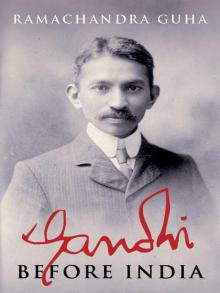 Gandhi Before India
Gandhi Before India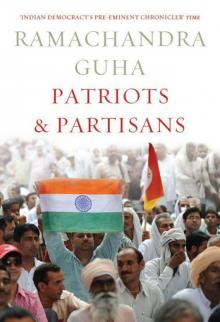 Patriots & Partisans
Patriots & Partisans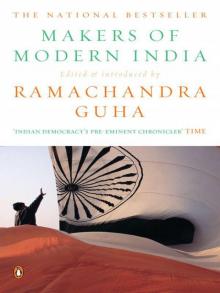 Makers of Modern India
Makers of Modern India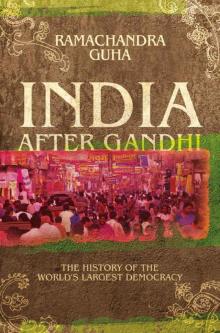 India After Gandhi: The History of the World's Largest Democracy
India After Gandhi: The History of the World's Largest Democracy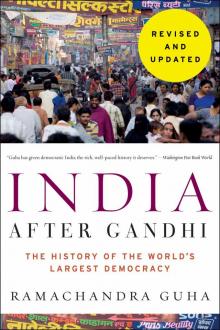 India After Gandhi Revised and Updated Edition
India After Gandhi Revised and Updated Edition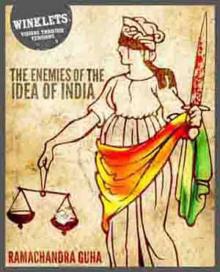 The Enemies of the Idea of India
The Enemies of the Idea of India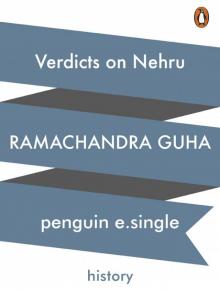 Verdicts on Nehru
Verdicts on Nehru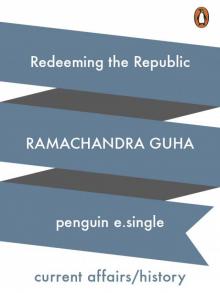 Redeeming the Republic
Redeeming the Republic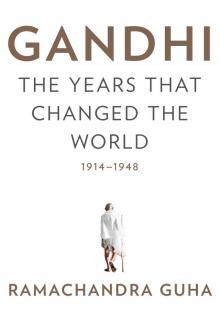 Gandhi
Gandhi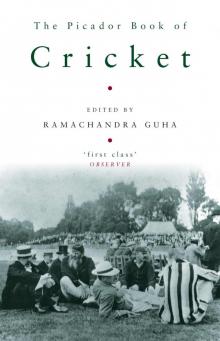 The Picador Book of Cricket
The Picador Book of Cricket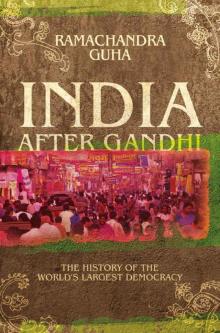 India After Gandhi
India After Gandhi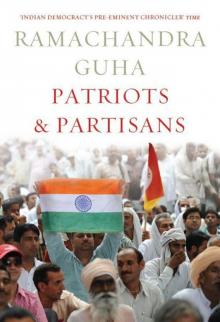 Patriots and Partisans: From Nehru to Hindutva and Beyond
Patriots and Partisans: From Nehru to Hindutva and Beyond